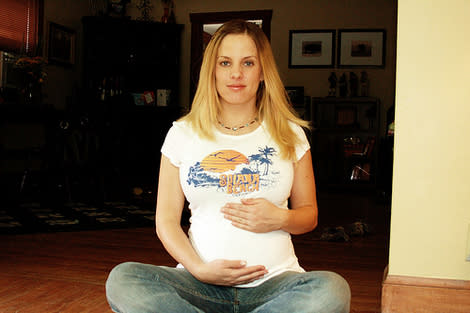Misconception: What Americans Get Wrong About Surrogates

I've always thought the decision to become a surrogate is a fascinating choice, and yet, I admit, I've assumed it comes down to the money. Why else would someone agree to carry somebody else's baby for nine months and then give it away?
Related: 25 powerful photos of women giving birth
Apparently, that's the single biggest misconception about American surrogates. So says Sherrie Smith, who, as The Atlantic reports, has run the East Coast office of the Center for Surrogate Parenting since 1998.
"Having a baby for someone else is as far from easy money as you can get." She tells The Atlantic.
Sherrie is the program administrator for the Center for Surrogate Parenting, one of the oldest, most respected surrogacy agencies in the world. She spends her days guiding prospective parents from around the globe through the surrogacy process. They're usually wealthy and very anxious. But CSP is the right place to be. It, along with Sherrie, have helped nearly 1,700 surrogate babies come into this world, including a son for Elton John and his husband and two sets of twins for former Good Morning America host Joan Lunden.
Sherrie's boss, Bill Handel, is a pioneer in California surrogacy law. He started the company without precedent and has spent years establishing a solid business philosophy based around the idea that the surrogate has equal standing among the usually wealthy clients, doctors, and lawyers. Handel says that goes a long way toward avoiding problems that arise and allaying the one major fear of parents-to-be: what if the surrogate changes her mind?
Handel's plan worked. Over the years CSP has become one of the best providers of surrogates in the world. As a result, Bill and Sherrie have learned a lot about the women who choose to carry babies and the infertile couples who seek their help. According to The Atlantic:
"The clients are usually older, richer, better educated, often with graduate degrees, and more likely to come from large urban cities… The majority of intended parents are heterosexual couples. Some are infertile due to biological abnormalities. Others face fertility challenges wrought by hysterectomies, car accidents, paralysis, or other medical problems. More and more are gay male couples (lesbian couples rarely hire surrogates, given the inexpensive, thoroughly-screened sperm on the market and the statistical improbability of two female partners both being infertile). Increasingly, there are more single women and single men who are consciously and openly choosing to become solo parents. CSP originally worked only with couples, but in 2009 the company changed its guidelines to welcome single parents."
So what about the surrogates? According to CSP, they're usually younger, with the average age coming in at 28 years old. Surprisingly, they're usually married with two or three of their own biological children. They're Christian, middle class, live in small towns or suburbs. In other words, according to The Atlantic, "Women who shop at Wal-Mart and Costco, not Whole Foods and Neiman-Marcus."
A surrogate makes, on average, between $20,000 to $30,000 per pregnancy but, as in any job, experienced surrogates can make more. About 35 percent of surrogates (who work for CSP) do it more than once and there is no limit to the number of time a surrogate can carry a for-profit baby.
But, as mentioned, while the money is good, it's not what it's all about. "It would be easier to get a job at McDonald's," Sherrie says. "The money doesn't begin to compensate them for what they do. A surrogate pregnancy means working 24 hours a day, 7 days a week, without a break, for nine months. Pregnancy is risky; pregnancy taxes your body tremendously. Our surrogates come to us because they love children, they want to help people who cannot have them, and they like the feeling of creating a family for other people."
Eh, I don't know if I'm still buying that. Yes, pregnancy is difficult and can be risky, but it's something you can do from home or from another job and $20,000 (tax-free) extra a year is not peanuts. CSP selects only twenty of the 400 women who apply each month to be surrogates, and a common reason for the rejection is that her motivation is focused on money.
The whole idea of surrogacy is fascinating and beautiful and something I've often wondered if I could do. If a loved one needed my help I'd offer it, no question. But a strange couple? I don't know. What about you? Could you carry a baby for nine months and give it up to strangers? Would it be all about the Benjamins?
- By Monica Bielanko
To see what post-baby bellies REALLY look like, visit Babble!
MORE ON BABBLE
29 things you should never say to a pregnant woman
13 ways pregnant women are exactly like toddlers
10 "unsafe" things I did while pregnant... and still had a healthy baby

